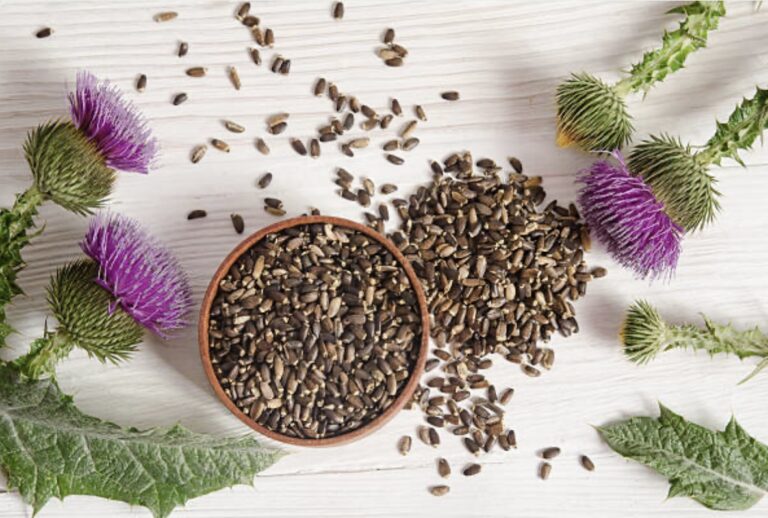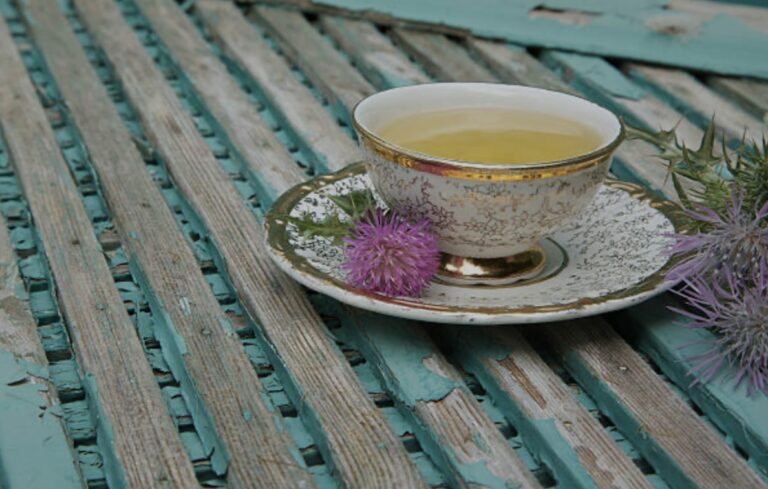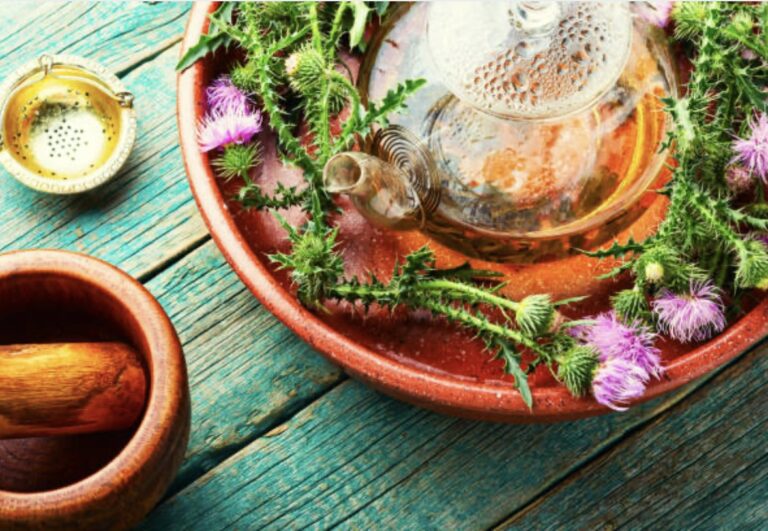Milk Thistle Benefits
In natural remedies, few have garnered as much attention and acclaim as milk thistle. Esteemed for its potent health benefits, particularly in supporting liver health, this plant’s therapeutic range extends beyond detoxification. Through careful examination and evidence-based findings, this blog post aims to demystify milk thistle, offering insights into its rich history, health benefits, and practical daily-use considerations. The benefits of milk thistle benefits are fantastic.
Overview of Milk Thistle
Origin and History
Milk thistle, scientifically known as Silybum marianum, has a storied past that dates back over 2,000 years. Originating from Mediterranean countries, it has been used traditionally in various cultures to treat liver and gallbladder disorders. The plant’s name derives from the milky sap that oozes out when its leaves are crushed and its distinctive feature of white veins.
Major Components and Nutrients
The secret to milk thistle’s health benefits lies in a complex of flavonolignans collectively referred to as silymarin. This compound, concentrated primarily in the seeds, is purported to have antioxidant, anti-inflammatory, and anti-fibrotic properties, making it a powerhouse of nutrients.
Common Uses in Traditional and Modern Medicine
Traditionally, milk thistle was used to remedy liver conditions, snake bites, and even seasonal allergies. In modern times, its application has broadened, extending to supporting liver health, protecting against toxins, and even assisting in managing diabetes and digestive disorders.

The Significance of Milk Thistle
Global Popularity and Scientific Interest
The global endorsement of milk thistle can be attributed to its therapeutic versatility and the growing body of scientific research supporting its benefits. This has sparked considerable interest in the scientific community, resulting in numerous studies exploring its potential.
Preliminary Research vs. Established Facts
While preliminary research suggests milk thistle could aid a range of conditions from cancer to skin health, it is essential to differentiate between promising early findings and well-established facts, particularly its benefits for liver health and antioxidant capabilities.
Milk Thistle and Liver Health
Hepatic Protection
Milk thistle has been shown to protect the liver by hindering toxins from attaching to liver cell membranes. It’s also believed to promote liver cell regeneration, a vital function given the organ’s central role in detoxification.
Enhancing Liver Regeneration
Beyond protection, silymarin assists in liver regeneration, fostering the growth of new liver cells to replace damaged ones, thus maintaining liver health and function.
Counteracting Toxins
By inhibiting toxins’ entry into liver cells, milk thistle ensures the liver can effectively process and eliminate harmful substances from the body without accruing damage.
Supporting Treatment of Liver Diseases
Numerous studies have highlighted milk thistle’s benefit in treating alcoholic liver disease, non-alcoholic fatty liver disease, and hepatitis, showcasing its role as an adjunct therapy in managing liver conditions.

Antioxidant Properties
Neutralizing Free Radicals
Silymarin’s antioxidant capabilities are formidable; it scavenges free radicals, thereby mitigating cellular damage—a key mechanism in its liver-protective effects.
Preventing Oxidative Stress Damage
By preventing oxidative stress, milk thistle safeguards the liver and other organs from damage, a testament to its antioxidant strength.
Comparison with Other Natural Antioxidants
Compared to other natural antioxidants like vitamin C or green tea, milk thistle stands out due to its specific action on liver cells and its ability to stimulate liver regeneration, setting it apart as a targeted therapeutic agent.
Milk Thistle’s Role in Digestive System Support
Improving Digestive Efficiency
Milk thistle has been noted to improve bile flow, essential for digesting fats and supporting overall digestive efficiency.
Aiding in Fat Digestion and Absorption
By stimulating bile production, milk thistle aids in the emulsification and absorption of dietary fats, crucial for nutritional maintenance.
Stimulating Bile Production
Increased bile production not only assists in fat digestion but also supports the elimination of waste products from the body, highlighting milk thistle’s comprehensive role in digestive health.
Impact on Gut Flora and Constipation
Preliminary studies suggest that milk thistle may positively affect gut flora and alleviate constipation, adding another layer to its digestive health benefits.
Alleviating Digestive Disorders
The herb’s anti-inflammatory and spasmolytic properties have shown potential in relieving symptoms of irritable bowel syndrome and other inflammatory bowel diseases, offering relief and improved quality of life for sufferers.

Boosting Immune Function and Reducing Inflammation
Strengthening Immune Response
Evidence suggests milk thistle can bolster the immune response, possibly by stimulating immunity cells, thus enhancing the body’s ability to fight infections.
Enhancing Immunity
This immune-boosting effect not only aids in the short-term, warding off common illnesses like the cold or flu, but also has implications for long-term health by potentially reducing the risk of more serious diseases.
Shortening Duration of Illness
By enhancing immune function, milk thistle may also shorten the duration of illnesses, an invaluable benefit in today’s fast-paced world.
Anti-inflammatory Effects
The anti-inflammatory capabilities of milk thistle are notable; by reducing inflammation, it may have a therapeutic effect on chronic inflammation and autoimmune diseases, conditions often marked by prolonged inflammation.
Mechanisms of Reducing Inflammation
Silymarin’s ability to inhibit the factors that cause inflammation and promote cell repair showcases its potential as a natural anti-inflammatory agent.
Impact on Chronic Inflammation and Autoimmune Diseases
Given the role of chronic inflammation in various diseases, milk thistle’s anti-inflammatory effects may provide a natural adjunct treatment option for managing autoimmune and inflammatory conditions.
Comparative Analysis with Standard Anti-inflammatory Medications
While not a substitute for standard anti-inflammatory medications, milk thistle offers a complementary approach, potentially enhancing treatment outcomes and offering an alternative for those seeking natural remedies.

Supporting Heart Health and Managing Diabetes
Cardioprotective Effects
Milk thistle’s antioxidant and anti-inflammatory properties contribute to its cardioprotective effects, offering potential benefits in preventing heart disease and maintaining cardiovascular health.
Reducing Cholesterol Levels
Some studies suggest that milk thistle can reduce cholesterol levels, a major risk factor for heart disease, showcasing its role in heart health management.
Preventing Atherosclerosis
By inhibiting oxidative stress and inflammation, milk thistle may prevent the development of atherosclerosis, the buildup of plaques in the arteries, further underscoring its cardioprotective properties.
Blood Pressure Regulation
Though research is ongoing, early evidence indicates that milk thistle may help regulate blood pressure, a key component in cardiovascular health.
Diabetes Management
Milk thistle’s role in improving insulin sensitivity and lowering blood sugar levels offers a promising adjunct therapy for diabetes management, with potential to reduce complication risks.

Side Effects and How to Use Safely
Recognizing Potential Side Effects
While generally considered safe, milk thistle can cause mild digestive side effects in some individuals. Recognizing and understanding these can guide better usage practices.
Common Adverse Reactions
The most common side effects include gastrointestinal issues such as bloating, gas, and diarrhea. However, these are typically mild and temporary.
Interactions with Medications and Conditions
Milk thistle may interact with certain medications, particularly those metabolized by the liver. Consulting with a healthcare provider before starting is crucial for those on medication or with existing health conditions.
Recommended Dosages and Forms
Dosage can vary depending on the form of milk thistle taken, with standardized extracts often recommended for their consistent silymarin content. Adhering to manufacturer’s instructions or a healthcare provider’s recommendations is essential for safe use.
Choosing and Using Milk Thistle Supplements
When selecting a milk thistle supplement, opting for standardized extracts can ensure a reliable dose of silymarin. Reading labels and understanding the product specifications can help in making an informed choice.
Factors to Consider When Buying
Quality and purity are paramount when choosing supplements. Looking for products with certifications from reputable bodies can aid in selecting a high-quality product.

Standardized Extracts vs. Whole Plant
While whole plant products offer a broader range of compounds, standardized extracts provide consistency in silymarin content, a key consideration depending on one’s health goals.
Guidelines for Safe Consumption
Starting with lower doses and gradually increasing, if needed, can help minimize side effects. Being mindful of one’s body’s reactions and consulting healthcare providers for personalized advice ensures safe and effective use.
Embarking on a journey with milk thistle can be a transformative step towards enhancing one’s health and well-being. Its rich history, backed by scientific research and centuries of traditional use, underscores its significance in supporting liver health, combating inflammation, and more. Integrating milk thistle into daily wellness routines requires informed choices and a commitment to listening to one’s body, paving the way for a healthier, more vibrant life.
The Marvelous Benefits of Milk Thistle Tea
Ever sat down with a warm cup of something and felt like it was not just soothing your soul but also whispering sweet nothings about health benefits to your body? If you haven’t yet, let me introduce you to the understated hero of the tea shelf – milk thistle tea. Yes, the same milk thistle that you’ve probably heard of in the context of herbal supplements and liver health. But there’s so much more to this prickly plant than meets the eye. So, grab your favorite mug, and let’s dive into the world of milk thistle tea.
Why Sip on Milk Thistle Tea?
If you’re someone who’s always on the lookout for ways to boost your health naturally, here’s why you might want to consider brewing yourself a cup of milk thistle tea:
Liver Love: Milk thistle is like a best friend to your liver. It helps support liver health by promoting the growth of new liver cells and protecting existing ones from damage.
Digestive Delight: Feeling a bit bloated or suffering from indigestion? Milk thistle tea can aid in soothing your digestive system, making that heavy meal feel less daunting.
Antioxidant Abundance: This tea is packed with antioxidants, which are substances that help protect your cells from damage. This means it could potentially help keep your skin looking radiant and reduce the risk of chronic diseases.

Making the Perfect Cup
Now, you don’t need to be a barista to whip up a soothing cup of milk thistle tea. Here’s a quick guide:
Boil water and let it cool for a minute or two (boiling water can destroy some of the beneficial properties of the tea).
Add about one teaspoon of milk thistle seeds to your teapot or use a tea infuser for convenience.
Pour the hot water over the seeds and let them steep for 5-10 minutes, depending on how strong you like your tea.
Strain (if needed) and enjoy. You can add honey or lemon to taste!
A Word of Caution
While milk thistle tea is generally considered safe for most people, it’s always good practice to chat with your healthcare provider before making it a regular part of your routine, especially if you’re pregnant, breastfeeding, or have a history of hormone-related cancers.
Wrapping It Up
Milk thistle tea isn’t just another pretty drink; it’s a beverage with a purpose. Whether you’re looking to support your liver health, aid digestion, or simply enjoy a cup of tea packed with antioxidants, milk thistle tea might just be the brew for you. So, the next time you’re browsing the tea aisle, don’t hesitate to give this herbal hero a try. Your body (and taste buds) might thank you!
Frequently Asked Questions
The best time can vary depending on the individual and the form of milk thistle being used. Consulting a healthcare professional for personalized advice is recommended.
Effects can vary based on several factors, including the specific health condition being addressed. Some may notice improvements within a few weeks, while for others, it may take longer.
While milk thistle is safe for most people, it can interact with some medications. It’s important to consult with a healthcare provider before combining it with other supplements or medications.
Though safe for many, individuals with certain health conditions or those pregnant or breastfeeding should consult with a healthcare provider before use.
Milk thistle is available in various forms, including capsules, tinctures, and teas. Choosing a form that fits best with your lifestyle and health needs is key to incorporating it effectively into your diet.


